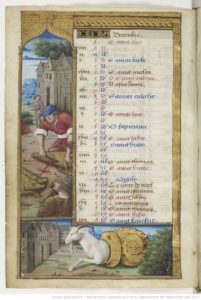Thomas Becket was born in Cheapside, London, to a family of somewhat better than modest means. His father Gilbert was either a small landowner or a petty knight, who may have worked for some time as a textile merchant. By the time Thomas was born, Gilbert was a property owner, living on the rental income from his properties in London. Thomas attended grammar school, but did not go on to college. When Becket’s father suffered a reversal in his finances, Becket found work as a clerk, eventually securing a position in the household of Theobald of Bec, the Archbishop of Canterbury.

“December”, kalendar page from Les Petites Heures d’Anne de Bretagne (The Little Hours of Queen Anne of Bretagne), by the Maître des Triomphes de Pétrarque. From Bibliothèque nationale de France, Paris (France).
In May of 1162, Becket was nominated to succeed Theobald as Archbishop of Canterbury. Becket was ordained a priest on June 2nd, and consecrated the next day. At about this time, Becket became an ascetic, and took to heart his vows to the church, becoming increasingly distant from the king. At one point, Becket had to flee to the continent, and it was only after Pope Alexander III sent papal legates to England to act as arbitrators that Becket was able to return to England.
The rapprochement was short-lived. In June 1170, the Bishops of London and Salisbury anointed the king’s son Henry as heir apparent. Becket saw this as a breach of Canterbury’s privilege, so he executed both bishops and young Henry. The king, needless to say, was furious—more so, probably because of his son’s excommunication, and not that of the bishops. In the presence of several knights, Henry is alleged to have said, “Will no one rid me of this turbulent priest?” (In the 1964 film with Richard Burton and Peter O’Toole, the king calls Becket a “meddlesome” priest.) In other reports, the king is more prolix. According to Edward Grim, who witnessed Becket’s murder and who later wrote a Life of St Thomas, the king said: “What miserable drones and traitors have I nurtured and promoted in my household who let their lord be treated with such shameful contempt by a low-born cleric!”
In any event, four of Henry II’s knights—Reginald FitzUrse, Hugh de Morville, William de Tracy, and Richard le Breton—travelled to Canterbury and confronted Becket, ordering him to report to Winchester. Becket refused, and proceeded to vespers in the nave of the cathedral. The four knights exited the church to retrieve their weapons. Some of the monks wanted to bolt the doors, but Becket ordered them to reopen the doors, saying, “It is not right to make a fortress out of the house of prayer!” The knights proceeded to kill Becket, primarily by bashing in his head with their swords.
As news spread of Becket’s murder, Becket was venerated and Henry was vilified. At the command of Pope Alexander, the king made a series of public penances: in Avranches Cathedral in Normandy in May of 1172; and in July of 1174 at St Dunstan’s Church, where he changed his clothing into sackcloth, and from whence he made his pilgrimage on foot to Thomas’s tomb at Canterbury Cathedral, where he underwent a second public penance. Meanwhile, Pope Alexander had canonized Becket in 1173.
Becket’s cult grew during the Middle Ages, and his tomb became a major destination for pilgrimages, most famously documented in Geoffrey Chaucer’s The Canterbury Tales:
And specially from every shires ende
Of Engelond, to Caunterbury they wende,
The hooly blisful martir for to seke
That hem hath holpen, whan that they were seeke.
Becket’s assassins were not prosecuted by the King, but neither did Henry intervene on their behalf when they were excommunicated by the Pope. As penance, and to earn forgiveness, the four travelled to Rome and thence to the Holy Lands to serve as knights for a period of fourteen years. Their service inspired the founding of the Knights of Saint Thomas in Acre in 1191. Modeled on the Teutonic Knights, it was Englands only native military order. The order was eventually dissolved by Henry VIII (who chose dissolution, rather than merging the order with one of the foreign orders, or simply nationalizing it).
Thomas Becket’s feast day is December 29th, the date of his murder in his cathedral.


